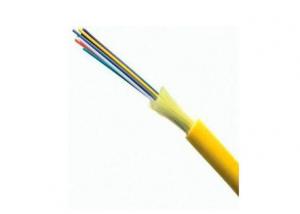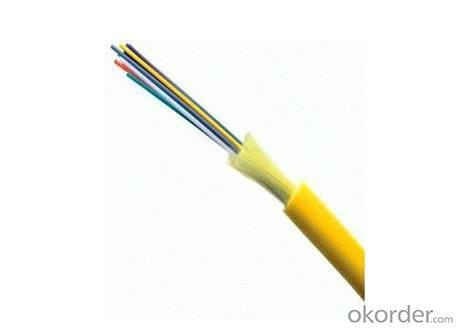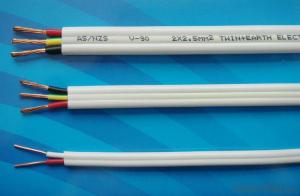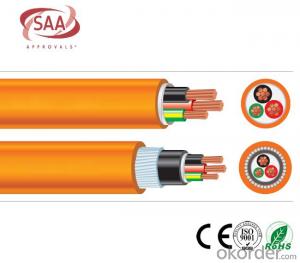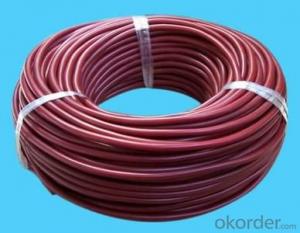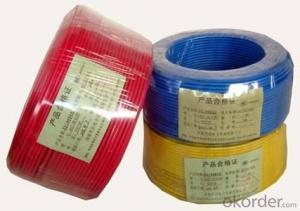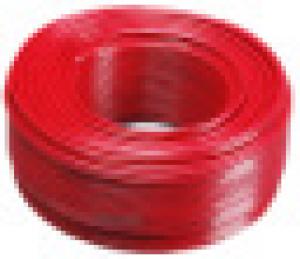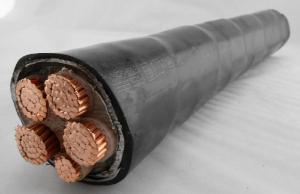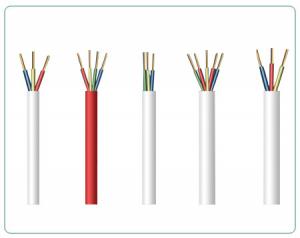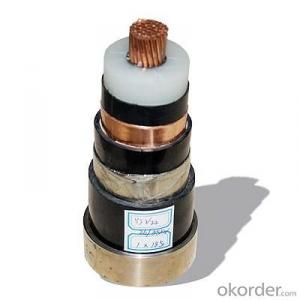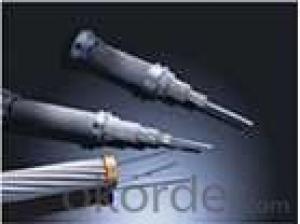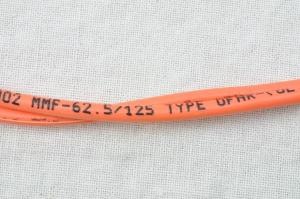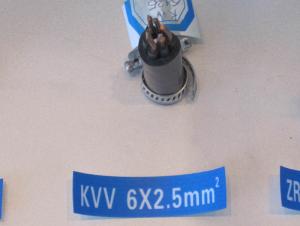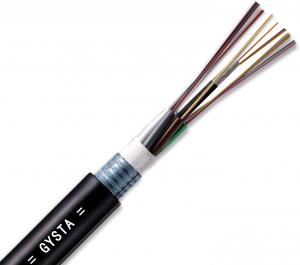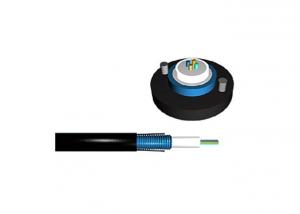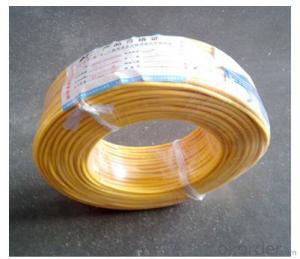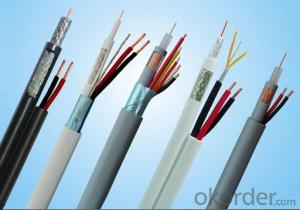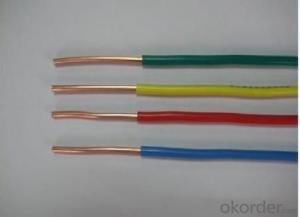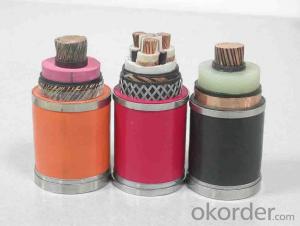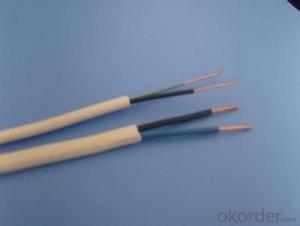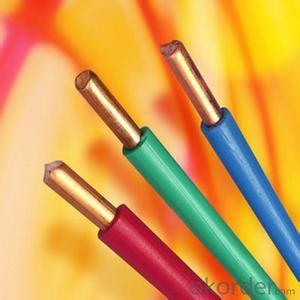Indoor Optical Fiber Cable
- Loading Port:
- China Main Port
- Payment Terms:
- TT or LC
- Min Order Qty:
- 1000 Meters m
- Supply Capability:
- 50000 Meters per Day m/month
OKorder Service Pledge
OKorder Financial Service
You Might Also Like
Specifications
1. Optical Fiber cable with high quality and low price
2. Free sample available
3. Fast delivery
Features
*PVC, LSZH Jacket Optional
*Cable diameter 0.9mm or 1.6mm or 2.0mm or 3.0mm optional
*Simplex, duplex optional
*OS1, OM1, OM2, OM3 fiber optional
*Color Standard compliant with TIA/EIA-598-A/-B
Data
Cable Diameter (mm) | 1.6 | 2.0 | 2.8 | |
| 600±50 | 900±50 | 900±50 | |
Cable weight (kg/km) | 3.3 | 4.2 | 6.4 | |
Long Term | 60 | 60 | 80 | |
| Short Term | 120 | 120 | 150 |
Bending Radius (CM) | Dynamic | 20D (D: Cable Diameter) | ||
Static | 10D (D: Cable Diameter) | |||
| -40°C~ +85°C | |||
-40°C~ +85°C | ||||
SMF 8.3/125 | OM2 50/125 | OM1 62.5/125 | ||
125±1.0 | 125±1.0 | 125±1.0 | ||
1310/1550 | 850/1300 | 850/1300 | ||
0.5/0.4 | 3.5/1.5 | 3.5/1.5 | ||
0.36/0.22 | 3.0/1.0 | 3.0/1.0 | ||
- Q: What is the difference between observing field wires, winter and summer? why? What should you watch if you set up a wire in the summer?
- You look at the background is not running the program did not exit the task manager to see that the CPU usage of the program to end it
- Q: i have a big box of many different kinds of wires (av, usb, power supplies, etc), but i don't know what most of them are and what they are used for. is there a website where i can find out what all of these wires are used for?
- You really have to identify the connector to identify the cable. For example if you identify a USB connector on each end, then the cable is probably a USB to USB cable (although there are at least 3 different types of USB connector). I'm not aware of any web site, there are too many thousands of different types, with dozens of new ones every day. .
- Q: Can anyone help me out! Does it have any ruled for electrical wiring? i know like the Neutral Wirer always goes to the light. The Live wirer should go to a switch. Does it have any more tips for me?
- Precisely what do you need to know? Is it a three way switch? A single pole switch? At home or at work? Different methods can be used in commercial buildings than residential work.
- Q: I'm doing some wiring in my house (lights, outlets) for a add on room in the basement. I plan on having the computer on one side of the room and the HDTV on the other side. In theory the Internet will be with the computer, and I run Network wire over to the TV and xbox 360 (about 35 ft away). (Yes I know some of these I could do wireless, but I can't do all of it that way)I was going to run some network wire through the walls while everything is being built. I also am running some Cable wire (For cable Internet and for an Antenna). My fear is, I'm going to have to cross over (next to) the electrical Wire that is in the wall and ceilings. I fear this could cause some interference on the line (TV, or Network). Is there anything I do to stop this? Actually my thought was to wrap the electrical wire in some Tin Foil, but I'm not sure if thats the best idea? I'm really just wanting to add another layer to block any interference? Thanks
- Tin foil won't do anything, especially if it's not grounded anywhere. If anything, the foil is it starts to corrode and rub against itself, may cause more RF static if it has any induced currents in it already. That may interfere with the TV even more The ethernet cable is not sensitive to the electrical cable, it should not cause any issues for that distance. Your cable TV cable, though, may get some induced 60hz hum, albeit very little over 35 feet. If using good quality CATV cable, like proper RG6, you should be ok.
- Q: I bought an air conditioner that has a 15a 240 vac plug (NEMA 6-15, I believe - 2 horizontal prongs above the ground) but my air conditioner wall outlet is a 20a 125 vac (NEMA 5-20, I believe - one vertical prong and one that looks like a sideways T above the ground). I have also ascertained that this outlet has its own circuit at the breaker box. I guess I am just curious how big of a procedure it would be to get the outlet changed, as I live in a big apartment building and am hoping it would not involve anything outside of my own apartment - and also that it is cost effective vs. just selling the air conditioner at a loss and buying a different one.
- It will involve swapping a double-pole breaker for the single-pole breaker you have now plus changing the outlet. The 15A 240v outlet has no common wire so you can re-use the wires you already have (hot/neutral becomes hot/hot). Unless you're out of space in the panel it should be a pretty straightforward job.
- Q: How are they wired up, and how do they work, thanks.
- If you are talking about a feed meaning a home run from the panel then the feed usually goes to the light and drops to the switch and can pick up a couple of recepticles in the wall also. The national electrical code allows for a white to switch hot if it is marked on both ends so you can use a two wire run. If you run from the panel to the switch box then you will have a hot switched for the light, one for the hot recepticles and a neutral for all. Keep in mind the green is allways used and only used for a bond and nothing else.That gives you a 3 wire and a bond going from the small switch box to the larger light box in the cieling, Which will work but is harder to follow years later if you have problems. If you run from the panel to the cieling box it is easy to locate and trouble shoot all wires as everything goes to that box. Most switches are single pole and require 2 wires and it is pretty much a in and out deal so that is simple enough but if it is a 3 way ( or switched at 2 places ) you have to use 3 way switches, If you want to switch from 3 places or more then you have to use 2 - 3 way and the rest 4 way. I realize I am not telling you all you have to know but electricity is not for people who dont know what they are doing. You can get shocked and others can get hurt or the house could burn down with you sleeping in it so I suggest you get out the Home Depot do it yourself books or go to the library and learn what and the whys of electricity. I hope what I have told you gets you to see that it takes some home work to make it safe and understandable.
- Q: I want to install two separate outdoor lights. How do I do that from one wire? How can I make one wire into two wires and what would I need? Thanks.
- this can be done with a external water proof junction box, be sure you know what you are doing, you could put your self and the building at risk.
- Q: I recently used some wire that is half as thick as regular wire for electrical. And i am wondering if that will work or should i get some thicker wire?
- Despite what some guys say, bigger is better. Speak to an electrician and get the correct size or go back to whatever you refer to as regular wire or a fire may be the result.
- Q: Home water heater is 5000W, said the wire is 4 level, you can press the big open? The
- Recommended with 30A to 40A, less than 30A will be easy for no reason to trip!
- Q: Electrical three-pin plug three lines of color are what color
- You use a few loom ah not to re-establish a broadband connection ah
1. Manufacturer Overview
| Location | Guangdong,China |
| Year Established | 2011 |
| Annual Output Value | US$50 Million - US$100 Million |
| Main Markets | 10.00% North America 10.00% South America 10.00% Eastern Europe 10.00% Southeast Asia 10.00% Domestic Market 10.00% Mid East 10.00% Eastern Asia 5.00% Western Europe 5.00% Central America 5.00% Northern Europe 5.00% Southern Europe 5.00% South Asia 5.00% Africa |
| Company Certifications | ISO 9001:2008;ISO 14001:2004;CE;ROHS |
2. Manufacturer Certificates
| a) Certification Name | |
| Range | |
| Reference | |
| Validity Period |
3. Manufacturer Capability
| a) Trade Capacity | |
| Nearest Port | Shenzhen,Hongkong |
| Export Percentage | 51% - 60% |
| No.of Employees in Trade Department | 6-10 People |
| Language Spoken: | English, Chinese, Japanese, Korean |
| b) Factory Information | |
| Factory Size: | 1,000-3,000 square meters |
| No. of Production Lines | 5 |
| Contract Manufacturing | OEM Service Offered Design Service Offered Buyer Label Offered |
| Product Price Range | Low and/or Average |
Send your message to us
Indoor Optical Fiber Cable
- Loading Port:
- China Main Port
- Payment Terms:
- TT or LC
- Min Order Qty:
- 1000 Meters m
- Supply Capability:
- 50000 Meters per Day m/month
OKorder Service Pledge
OKorder Financial Service
Similar products
Hot products
Hot Searches
Related keywords
